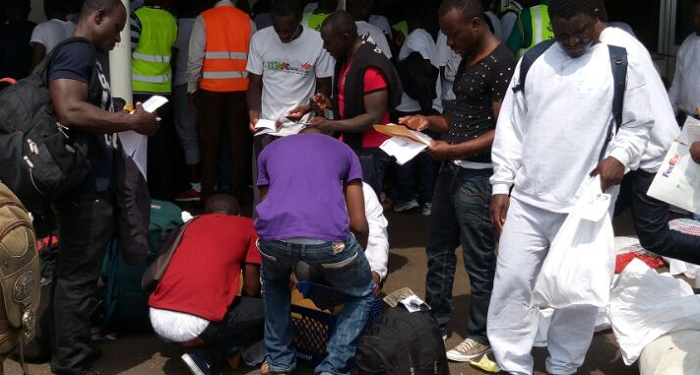Ghanaians in the U.S face an uncertain and potentially perilous future as President Donald Trump’s administration escalates deportation efforts and contemplates adding Ghana to a controversial new visa ban list.
As part of a renewed hardline immigration policy, the United States Immigration and Customs Enforcement (ICE) has placed 3,228 Ghanaian nationals on the deportation list since January 2025—nearly ten times the number deported in the previous four years combined.
Meanwhile, a leaked memo from the U.S. State Department has revealed that Ghana is among 36 countries, including 25 in Africa, being considered for sweeping visa restrictions unless urgent security cooperation reforms are made.
Ghana facing possible visa suspension
A confidential document dated Saturday and signed by U.S. Secretary of State Marco Rubio outlines plans to expand the U.S. travel ban list—citing national security concerns, visa overstay rates, and inadequate information-sharing protocols with U.S. immigration and intelligence agencies.
Ghana, which saw 25,000 visas granted out of 61,000 applications in 2024, has now been given a 60-day deadline to comply with new U.S. security benchmarks or risk visa suspensions affecting tourism, business, study, and immigration.
According to the memo, affected countries must submit detailed action plans to upgrade border security systems and improve real-time data exchange on their nationals who travel to the U.S. Failure to do so will result in a block on key visa categories, particularly non-immigrant and diversity visa applicants.
This policy expansion mirrors Trump’s first-term travel ban that primarily targeted Muslim-majority countries, and now looks set to disproportionately affect African nations—including one of America’s closest West African partners, Ghana.
Deportation surge creates shockwaves
ICE records indicate that deportations of Ghanaians rose steadily from 2021 to 2024, with 56 deported in 2021, 46 in 2022, 62 in 2023, and 94 in 2024.
But the nearly 3,228 currently facing removal orders in 2025 marks a dramatic escalation.
Deportees are being removed from urban centers such as Newark (25), New Orleans (23), Philadelphia (22), Atlanta (21), San Diego (11), and Washington, D.C. (10).
The reasons include criminal convictions, immigration fraud, and visa overstays.
Ghanaian immigrants—documented and undocumented—are expressing fear and anxiety, especially given the estimated 30,000 to 50,000 Ghanaians believed to be living in the U.S. without legal status. For them, Trump’s revived enforcement agenda is not just policy, but personal peril.
New registration rules
Alongside deportation efforts, the Department of Homeland Security (DHS) and U.S. Citizenship and Immigration Services (USCIS) have enacted a new rule—reviving a 2017 Trump-era directive—that mandates all non-citizens aged 18 and above, including Ghanaians, to carry proof of legal status at all times.
Acceptable documents include a Green Card, valid visa stamp, or I-94 entry record. Parents or guardians must register children under 14, while all non-citizens turning 14 must undergo biometric processing—including fingerprinting—within 30 days.
Even those previously registered must now re-register using the new Form G-325R. Failure to comply could result in detention or deportation, regardless of an individual’s prior legal standing.
This regulation, which quietly took effect last Friday, has triggered alarm among Ghanaian students, workers, and visitors, many of whom fear being caught off-guard and swept into ICE custody.
Record detention numbers
New data from the Transactional Records Access Clearinghouse (TRAC) shows that as of June 1, ICE is detaining 51,302 individuals across its nationwide facilities—the highest number since September 2019.
The surge in detentions aligns with Trump’s renewed emphasis on mass enforcement rather than case-by-case discretion.
For Ghanaians, particularly in heavily populated diaspora hubs like New York, New Jersey, Virginia, and Maryland, the current environment is becoming increasingly hostile.
“We are seeing the return of a system where the color of your passport and the legality of your stay could suddenly dictate your freedom,” said a Ghanaian immigration lawyer based in Maryland.
Students and skilled workers also affected
With a record 9,394 Ghanaians enrolled in U.S. universities during the 2023–2024 academic year—a 45.2% increase—there is growing concern that even high-performing students could face indirect consequences from the crackdown.
Many rely on Optional Practical Training (OPT) and other visa pathways post-graduation, which now face delays and heightened scrutiny.
Similarly, Ghanaian professionals in the medical and IT sectors report rising anxiety over visa renewals and workplace compliance checks.
Ghanaian authorities urged to act swiftly
In response to these developments, Ghana’s Foreign Affairs Ministry and consular officials in the U.S. are under mounting pressure to engage American authorities diplomatically.
Civil society groups and diaspora organizations are calling for immediate bilateral talks, humanitarian waivers, and legal protections for affected citizens.
Already, some Ghanaian missions in the U.S. have begun collaborating with immigration attorneys and nonprofits to assist those targeted for removal.
But with ICE’s machinery operating at full throttle and the visa ban clock ticking, these efforts may prove insufficient without top-level political intervention.
A dimming horizon for Ghanaian aspirants
Ghana’s historic relationship with the U.S.—rooted in educational, economic, and people-to-people exchanges—is now at risk.
The confluence of mass deportations, a looming visa ban, and rigid immigration rules threatens to derail thousands of dreams and long-term goals.
What began as campaign rhetoric has turned into lived reality. And unless urgent diplomatic solutions are found, Ghana’s status as a trusted U.S. partner may soon be overshadowed by suspicion, exclusion, and lost opportunity.











